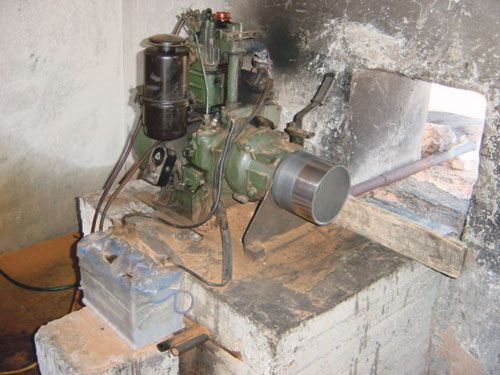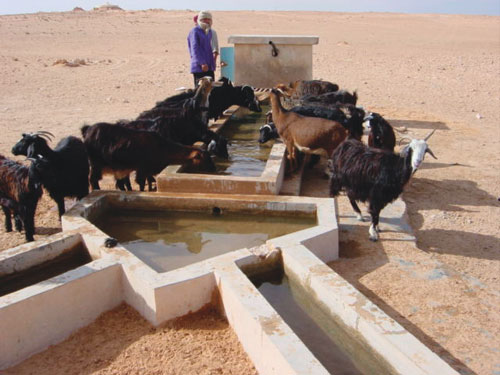Japan's Official Development Assistance White Paper 2005
Column II-7 Private Power Generation Using Tunisia's Solar Light

Diesel electrical equipment attached to one of the wells in southern Tunisia (Photo: JBIC)
In rural areas in southern Tunisia, located near the Sahara desert, the annual rainfall is extremely minimal at 100 to 200 mm (Tokyo's annual rainfall is approximately 1,500 mm). Therefore, the local residents must depend on underground water for daily use. As part of the water supply projects for this region, so far Japan has helped in efforts such as the development of wells. Meanwhile, a steady supply of water can be secured not only by digging wells, but also by installing electric pumps that draw water from these wells. Such measures are important because they provide the required amounts of drinking water for local residents and support livestock farming, one of the main industries in this area. In addition, regarding water quality, the underground water of southern Tunisia is high in sodium and has to be desalinated in order to be potable. To address such challenges comprehensively, it is necessary to supply electricity sufficiently.
In the urban areas of Tunisia, most households are fully equipped with electricity. By contrast, in the rural regions in the south, electricity is unevenly distributed. In terms of the discrete placement of wells, this type of electricity distribution necessitates wells, in most cases, to be equipped with diesel-electric generators. Since these generators require fuel to operate, local residents must load up their trucks with plastic tanks and drive to a town tens of kilometers away on unpaved roads to purchase the fuel. Moreover, diesel-electric generators malfunction easily without proper maintenance, and repair fees, as well as these other factors, have become a great burden on the local residents.
To improve this situation, Japan has taken advantage of Tunisia's geographical characteristic - its long daylight hours - to provide assistance through a yen loan in introducing solar energy generation equipment that will replace diesel-electric generators. Japan has the highest share in the world for the manufacturing of solar batteries and possesses advanced technology on photovoltaic generation. Sunlight is a renewable energy that does not consume fossil fuel. In addition, solar power generation does not pollute the air like diesel-electric generators and is easier to maintain. While local residents must drive hundreds of kilometers, with tires getting stuck in the sand, in order to have faulty generators repaired, the solar power generation device only requires twice-yearly checkups.

Livestock drinking water (Photo: JBIC)
It is expected that the electricity generated through the use of Tunisia's abundant sunlight will reduce burdens on the local people and contribute to securing a steady water supply and clean air.


 Next Page
Next Page